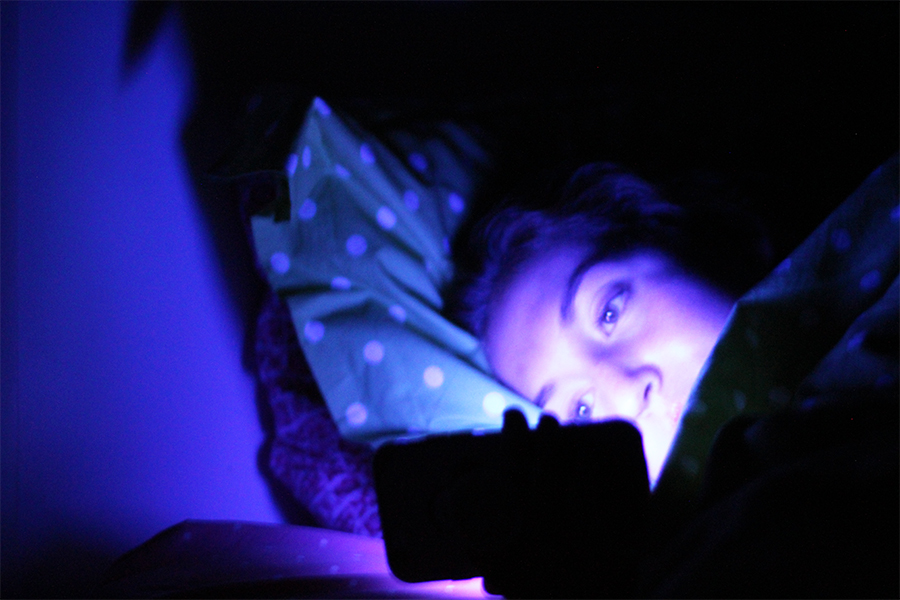Sleep: A friend or foe
Sleep is falling lower and lower on students’ priority lists, causing a rising trend in sleep deprivation.
September 18, 2018
It is 12:30 a.m. and junior Molly Sexton is sitting in bed debating whether to finish that last math assignment or get to sleep by 2:00 a.m. The little voice in her head tells her, “Sleep can always be made up, but some grades cannot be.” She questioned if that voice in her head is right. Should sleep be low on a high school student’s priority list?
The next day Sexton finds herself dozing off in class. As she repeatedly tries to wake herself up before l the teacher notices, she thinks to herself, “Will this cycle ever end?”
“I feel constantly tired,” Sexton said. ” Usually, I will wake up and have an adrenaline rush. I will be so awake for the first couple periods. Then if I eat lunch I will get some energy but I still find myself falling asleep in class.”
According to the National Sleep Foundation, for most high school students, sleep is very lowon their priority lists. Almost 70 percent of teenagers are not getting the recommended amount of sleep they need.
A common factor that can severely detriment high school students’ sleeping schedules is sleep disorders. Senior Erris Pierson has recently been struggling with whether she has a sleep disorder called narcolepsy.
“In my case, being narcoleptic means that I sleep too much,” Pierson said. “However, I am always tired.”
Her routine consists of going home, taking a nap, waking up, doing homework and then going right back to bed. However her increase in headaches has caused her to question her sleep health.
“I think that school definitely has affected my sleep whether I have narcolepsy or not,” Pierson said. “I think that is why I thought it was so normal. I thought, ‘School just runs me down.’ But when it came down to the fact that I was choosing sleep over a lot of other things, I knew it was time to check it out.”
She has previously tried to boost her energy by beginning her morning with exercise, which would usually give her the adrenaline needed for the day.
“I wish going to bed at 9 p.m. and waking up at 6 a.m. would give me good rest, because it should,” Pierson said. “But it doesn’t, and I still find myself constantly being tired.”
Pierson will be participating in a sleep study in order for neurologists to confirm her narcolepsy.
“I am kind of nervous because what if something is wrong, you know?” Pierson said. “But I also have to sleep in a hospital so that’s not fun.”
STA counselor Amanda Johnson talks to many students who struggle with sleep deprivation.
“Sleep is a constant struggle for a lot of people,” Johnson said. “Especially among young people with everything on their plates.”
Not getting enough sleep or having sleep difficulties can limit the ability for students to learn and focus. According to the National Sleep Foundation, when sleep deprived, individuals are as impaired as driving with a blood alcohol level of 0.08% which is illegal for drivers in many states.
“You are not making good choices throughout the day,” Johnson said. “Maybe you are falling asleep in class or you’re not taking notes the way you normally would. Sometimes we are so exhausted that our brain can’t function at top capacity.”
Johnson is no stranger to sleep deprivation due to her schedule in high school.
“I remember my sophomore year was the worst year for sleep and my emotional health,” Johnson said. “I was in three very competitive sports. I was trying to do too much.“
One of the main reasons students don’t get enough sleep is because of their busy schedules, something Johnson struggled with as well. .
“I wanted to do all of these things,” Johnson said. “I was telling my parents ‘I can handle it, I’ve got it.’ I managed it, but I managed it poorly.”
Johnson remembers finally reaching her breaking point. After a sudden fall in figure skating, she admitted to herself that she simply could not keep up with her schedule.
“I was actually very relieved when I fell,” Johnson said. “It was painful but I remember thinking ‘Okay, I don’t think I can do this anymore.’ I was just so tired.”
Teenagers need 8 to 10 hours a sleep a night, and its estimated that only 15 percent are getting that amount according to the National Sleep Foundation.
“I would say the one thing I would challenge students to do –because I have been in your shoes on some level– would be don’t be afraid to communicate,” Johnson said. “If it’s one in the morning and you haven’t gotten to your Spanish homework, talk to your teacher. Tell them what is going on.”
Recognizing the signs of sleep deprivation includes realizing when regular habits change.
“If you take sleep off your plate, you are affecting your body processes, your appetite and your brain functions,” Johnson said. “Sleep affects everything.”
